Brent Marchant's Blog, page 73
November 12, 2019
‘Jojo Rabbit’ charts the challenges of growing up
“Jojo Rabbit” (2019). Cast: Roman Griffin Davis, Scarlett Johansson, Thomasin McKenzie, Taiki Waititi, Sam Rockwell, Rebel Wilson, Alfie Allen, Stephen Merchant, Archie Yates. Director: Taiki Waititi. Screenplay: Taiki Waititi. Book: Christine Leunens, Caging Skies. Web site. Trailer.
Growing up can be difficult enough as we seek to understand the complexities of the world around us. But, if we add to that a quest to grasp an emerging sense of self and the place we occupy in our existence, the task can become overwhelming. Where do we turn for guidance? Who can we trust? And what advice should we seriously consider? Those questions might seem obvious and fundamental, but that doesn’t make them any less daunting, especially for those who lack direction on which way they should turn. So it is for an impressionable young man in the engaging and unusual new coming of age story, “Jojo Rabbit.”
Young Johannes Betzler (Roman Griffin Davis) is having trouble fitting in. Growing up in Germany in the waning days of World War II, the likable but geeky 10-year-old is looking to find himself, a formidable challenge given the deteriorating conditions in the homeland and in his own personal circumstances. With his soldier father supposedly missing in action and his older sister Inge having recently died from influenza, he lives with his doting mother, Rosie (Scarlett Johansson), a caring soul who tries to help the lad in his quest. But it’s an effort he often resists; he sees her sensitivity as holding him back from becoming the man he believes he’s supposed to be (even though he is more innately compassionate than he’s willing to admit). She’s also somewhat secretive, a quality he finds quietly suspect, despite not knowing exactly what’s driving those feelings.
To compensate for all this, Johannes decides to join a Hitler youth group with his best friend, Yorki (Archie Yates), an operation run by the somewhat-befuddled Capt. Klenzendorf (Sam Rockwell). He hopes that being in the company of peers will help him to shape up and find himself. Also, as an ardent patriot concerned about the sinking welfare of the Fatherland, he genuinely aspires to serve his country in a heartfelt, meaningful way by learning about military tactics and upholding the principles of the Reich. He even has a personal avatar to help guide him, Adolph (Taiki Waititi), a comical imaginary embodiment of the Führer who speaks to his young follower in a way that the impressionable youth can understand.

Impressionable youth Jojo Betzler (Roman Griffin Davis, left) converses with his imaginary friend and avatar, Adolph (Taika Waititi, right), in the comical and controversial coming of age story, “Jojo Rabbit.” Photo by Kimberly French, courtesy of Twentieth Century Fox Film Corporation.
However, despite the youngster’s gumption and sincerity, he quickly discovers he’s not cut out for becoming a youth group member. Despite words of encouragement from Adolph, he lacks the capacity for the kind of cut-throat activities being taught, such as a lesson in callously snapping the neck of a cute, cuddly bunny. He’s branded a coward, one who would unhesitatingly flee in the face of danger, not unlike the now-deceased cottontail, a reputation that earns him the disparaging nickname Jojo Rabbit.
Embarrassed and disheartened, Jojo feels dejected that his latest efforts to find himself seem to have yet again failed. Rosie sees his disappointment and decides to intervene, helping Jojo to get an assignment working as an administrative aide to Capt. Klenzendorf and his minions (Rebel Wilson, Alfie Allen), a post that apparently suits him. The youngster feels as though he’s finally making a meaningful contribution, one that serves the interests of the Fatherland, even if it’s not exactly the kind of heroic effort that he had hoped to make. Little does he know, though, that there’s an opportunity waiting in the wings for that, should he choose to pursue it.
While at home alone one day, Jojo hears mysterious sounds coming from his late sister’s bedroom. He investigates and discovers a teenage Jewish girl, Elsa (Thomasin McKenzie), hiding in an adjacent crawlspace. Jojo is shocked, especially when he learns that Rosie is responsible for shielding Elsa, who had been one of Inge’s best friends. He’s appalled that his own mother would do something so blatantly against the interests of the Reich, especially given her many connections to those in the local Nazi hierarchy. He’s also shocked that he’s in such close proximity to someone Jewish, particularly in light of all of the “hideous” qualities he’s heard about these alleged enemies of his people.

Aspiring Hitler youth group member Jojo Betzler (Roman Griffin Davis, right) struggles to find himself, even with the guidance of his doting mother, Rosie (Scarlett Johansson, left), in director Taika Waititi’s “Jojo Rabbit.” Photo by Larry Horricks, courtesy of Twentieth Century Fox Film Corporation.
Jojo is compelled to do something about this unforgiveable breach, but the upstart is quickly put in his place by both Elsa and Rosie. Elsa calls out Jojo as a little man seeking to fill big shoes by joining a movement whose dastardly initiatives he barely understands, contending that he’s just following the crowd in hopes that it will help him feel like he’s finally found a place where he can fit in. Rosie, meanwhile, attempts to use the situation as a teaching moment, urging Jojo to look into his heart to find his compassion and to realize that others who are different from him are not the monsters they’ve been made out to be.
Before long, Jojo is torn about what to do: Should he do his “civic duty” and turn in the fugitive hiding in his house? Or should he allow himself to follow his heart and demonstrate his capacity for the human kindness of which he’s just now beginning to become aware? It’s a difficult decision, one that frequently gets tested, most notably when he’s paid a visit by the head of the local Gestapo (Stephen Merchant) after rumors begin to spread about what may be happening in his home. And, through it all, Jojo continues engaging in his virtual conversations with Adolph, who grows steadily more insistent about what he believes his loyal disciple must do, not only to be a good citizen, but also to be a “real” man.
With Russian and American forces quickly encroaching from opposite directions, and with dramatic events that hit close to home increasingly impinging on Jojo’s personal circumstances, the young man will soon face difficult choices that affect both him and those close to him. And, as events reach a crescendo, it remains to be seen what decisions he’ll make. But, given his desire to be a true hero, one can only hope that he follows a path in line with that desire.

Patriotic Nazi youth Jojo Betzler (Roman Griffin Davis, left) is perplexed about what to do when he finds a Jewish teenager, Elsa (Thomasin McKenzie, right), hiding in a crawlspace in his family home in the controversial new comedy, “Jojo Rabbit.” Photo by Kimberly French, courtesy of Twentieth Century Fox Film Corporation.
Finding oneself is often a challenging process, and Jojo’s experience makes that abundantly clear. Since it’s a quest that doesn’t come with an instruction manual, there’s usually nothing tangible to grasp onto in charting a course and being able to move forward. However, a good starting point – even if not fully enlightening at the outset – is to look within, to examine our inner being, as that may provide some valuable clues. This is particularly true when it comes to our thoughts, beliefs and intents, the cornerstone of who we are, what we want and what we hope to achieve through the conscious creation process, the philosophy that maintains we draw upon these resources in manifesting the reality we experience. Deciphering this interior landscape can be complicated and puzzling, but it at least has the potential to steer us in the right direction.
Examining our beliefs can be filled with surprises. For example, Jojo seems to think that all young men are supposed to grow into some kind of uber-macho mindset, one in which they assert themselves as tough, courageous individuals. What’s more, they’re supposed to swear to following the chain of command, unswervingly and unquestioningly demonstrating loyalty and following orders, no matter what they are or who gives them. He’s clearly bought into a well-established way of thinking, the embodiment of the classic male stereotype.
But, as Jojo slowly comes to discover, courage takes many forms, not all of which conform to the classic conventional model. Courage, for instance, can also come from being willing to freely exercise one’s individuality, even if its qualities differ from those of more widely accepted prototypes. In a regimented society like Nazi Germany, taking steps to openly affirm one’s worldview in the face of the rigid control tactics of an authoritarian regime is a supreme act of defiance, one that requires vast infusions of personal courage. It’s a prospect that Jojo eyes as he gets to know himself better, learning what his true beliefs are, despite the peer pressure he faces from so many others, including his outspoken imaginary friend.
Jojo faces a particularly difficult task when it comes to tuning out Adolph’s influence. As someone who lacks a meaningful male role model to help guide him in his development, it’s understandable how he’d gravitate to a strong-willed, charismatic figure like his personal avatar. But can Jojo trust the “advice” he’s being fed? Considering what the Nazi autocrat stands for and given Jojo’s emerging awareness of his sense of self, there’s quite a disconnect between these viewpoints. He’s faced with quite a difficult decision in choosing which path to embrace.

With the assistance of his mother, Rosie (Scarlett Johansson, second from left), geeky Hitler youth group member Jojo Betzler (Roman Griffin Davis, second from right) finds a suitable post working as an administrative aide to the befuddled Capt. Klenzendorf (Sam Rockwell, left) and his minion, Fräulein Rahm (Rebel Wilson, right), in director Taika Waititi’s “Jojo Rabbit.” Photo by Larry Horricks, courtesy of Twentieth Century Fox Film Corporation.
Of course, there’s always the possibility that Jojo created a presence like Adolph to help shepherd him in the right direction by purposely giving himself a negative example, one so ultimately repulsive that it’s patently obvious he embodies a mindset that is not meant to be followed. As counterintuitive as that might seem, sometimes we give ourselves our best advice through exposure to influences we’re truly supposed to avoid. Doing so pushes us to think for ourselves, to disregard the conventional “wisdom” in favor of our own outlooks, a practice that can pay big personal dividends in the long run.
One of the most important benefits that comes from this is an appreciation of our sense of personal integrity. Being truthful with ourselves, especially when it comes to assessing, appreciating and embracing our beliefs, is essential to getting the best results with our manifestation efforts. When we’re in sync with what we really think, feel and believe, we’re much more likely to experience an existence that faithfully reflects these qualities. It’s somewhat ironic, for example, that Jojo begins to discover things about himself as the war winds down and the Reich’s rule evaporates. The dissolution and disappearance of those negative elements of his reality reflect the emergence of his positive inner qualities. With the unwanted aspects of his existence being swept away, space is opened up to make room for more desirable ones – peace, compassion and the ability to be oneself, no matter what. One might not think this amounts to much when it occurs on an individual scale, but, when it happens for multiple individuals simultaneously, it can create a groundswell of change that has the potential to reform society overall. And that, for what it’s worth, represents a fundamental shift, one from which all of us can benefit.
Writer-actor-director Taika Waititi has taken quite a chance with this comical and controversial coming of age story. The film walks a fine line between evoking hearty laughs while addressing the atrocities of the Nazi regime, a satirical mix that squarely hits some notes while sadly missing others. The picture starts out strong and finishes well, though its drawn-out, meandering middle stymies the film’s overall momentum, detracting from the film’s bookend segments. To its credit, “Jojo Rabbit” features fine performances by Davis as the often-baffled youth (proving again, as in “Hunt for the Wilderpeople” (2016), that the filmmaker is quite adept at working with young actors) and by Waititi as Adolph, as well as an excellent Wes Anderson-esque production design and a fittingly hip rock ʼn roll soundtrack. However, in seeking to take his filmmaking ability to the next level, Waititi comes up short, not quite attaining the auteur status that he obviously sought with this production. It’s a valiant and noble effort overall but one where the director’s reach definitely exceeds his grasp.

Our personal explorations of discovery can be filled with joy, terror and uncertainty, sometimes all at once. Sorting out matters can prove quite challenging, too, especially if we lack the tools to handle the task. However, by earnestly looking within, the answers will become unlocked, providing us with the guidance on how to proceed. The process may not be without obstacles, and we might not get things “right” on our first attempt, but it at least gets us started. One would hope it takes us in the right direction, infusing us with the courage to stand up and be ourselves – even when circumstances try to make us feel like frightened rabbits, a threat that can be successfully thwarted before it ever takes hold.
Copyright ©2019, by Brent Marchant. All rights reserved.
The post ‘Jojo Rabbit’ charts the challenges of growing up appeared first on Brent Marchant.
November 8, 2019
‘Parasite’ exposes the fallout of false intentions
“Parasite” (“Gisaengchung”) (2019). Cast: Kang-ho Song, Hye-jin Jang, So-dam Park, Woo-sik Choi, Sun-kyun Lee, Yeo-jeong Jo, Jung Ziso, Hyun-jun Jong, Jeong-eun Lee, Myeong-hoon Park, Seo-joon Park, Keun-rok Park. Director: Bong Joon-ho. Screenplay: Jin Won Hon and Bong Joon-ho. Web site. Trailer.
When the have-nots stare down the ample resources of the haves, there’s almost always sure to be a degree of envy involved. “How is it that they’ve come to acquire what we haven’t?” they might legitimately ask. “Why can’t we have some of that?” Those questions have merit, too. But how far are the have-nots willing to go to get what they seek? That’s a crucial issue posed in the new social satire, “Parasite” (“Gisaengchung”).
Times are tough for the Kim family. With money and work hard to come by, the foursome struggles to survive in their cramped, rundown apartment. Family matriarch Chung-sook (Hye-jin Jang) seeks to earn money folding pizza boxes, a job at which she’s not especially suited, while her husband, Ki-taek (Kang-ho Song), a jack of all trades, will take anything he can get. Their son, Ki-woo (Woo-sik Choi), a former military man, can’t seem to find a position that matches his skills, while his sister, Ki-jung (So-dam Park), an adept graphic artist and computer operator, languishes without a job. Things look bleak.

The Kim family (from left), son Ki-woo (Woo-sik Choi), father Ki-taek (Kang-ho Song), mother Chung-sook (Hye-jin Jang) and daughter Ki-jung (So-dam Park), struggle to eke out a living in an economically disparate society in director Bong Joon-ho’s masterful new release, “Parasite” (“Gisaengchung”). Photo courtesy of NEON CJ Entertainment.
However, when Ki-woo’s friend Min (Seo-joon Park) pays him a visit, a new door opens. Min, a college student who’s planning to embark on a year of overseas study, works as a private English tutor for a wealthy family, a job that pays quite generously. He tells Ki-woo that he’s recommending him to take over in his absence, an offer that his unemployed friend finds tempting but puzzling. Ki-woo doesn’t believe he’s qualified for the job, but Min reminds him of how well he scored on college admissions tests and that he could readily take over for him. Min explains that his teenage pupil, Park Da-hye (Jung Ziso), is the daughter of an affluent businessman, Park Dong-ik (Sun-kyun Lee), and a stay-at-home mother, Park Yeon-kyo (Yeo-jeong Jo). Min adds that Da-hye’s mom is rather dim and gullible, someone who could be easily bluffed into hiring Ki-woo as his would-be successor.
Though skeptical, Ki-woo agrees to an interview, during which he discovers that Min’s description of his prospective employer is right on target. He tactfully schmoozes Yeon-kyo, who’s quite impressed with Ki-woo’s alleged pedigree. His hopes and enthusiasm are further raised when he meets his student, to whom he takes quite a shine, an attraction that’s apparently mutual. It looks like the job is his.
During his visit to the Park family residence, a lavish home built by and once inhabited by a famous architect, Ki-woo also meets the family’s young son, Da-song (Hyun-jun Jong), an intelligent but hyperactive youngster with a penchant for creating colorful but bizarre works of art. Yeon-kyo boasts her pride in her son’s accomplishments but says she wishes she could find someone who could help guide him in his efforts, a statement that gives Ki-woo an idea: He says he knows a skilled art instructor who could provide Da-song with helpful coaching, someone with whom he could put in a good word. Yeon-kyo jumps at the chance, unaware that Ki-woo is talking about his sister, a relationship he doesn’t reveal.

Wealthy businessman Park Dong-ik (Sun-kyun Lee, left) and his gullible stay-at-home wife, Park Yeon-kyo (Yeo-jeong Jo, right), get duped into unwittingly hiring an entire family of employees with dubious plans in mind in the hilarious new social satire, “Parasite” (“Gisaengchung”). Photo courtesy of NEON CJ Entertainment.
In no time, Ki-jung is working as an “art therapist” for Da-song, a position on which she sells Yeon-kyo after convincingly pointing out the recurring “troubled” imagery in her son’s artwork. And, thanks to a referral from Ki-jung, Ki-taek soon becomes the Parks’ new family chauffeur after the crafty art therapist sets up the disgraced now-former driver (Keun-rok Park) into being fired based on trumped-up allegations. Something similar occurs when Ki-taek manipulates the dismissal of the family’s long-time housekeeper, Moon-gwang (Jeong-eun Lee), creating an opportunity for a glowingly recommended Chung-sook to fill the now-vacant caretaker position.
Given this good fortune, one would think the Kims would be grateful for their newfound prosperity. However, having gotten a taste of the good life, they look for new ways to feather their nest even further – and by even more nefarious means. And, when the Parks go away for a camping weekend to celebrate Da-song’s birthday, the Kims move in to their employer’s home to party down, unapologetically availing themselves of the comforts of affluence. They enjoy ample food and drink and celebrate their unforeseen luck.
But the festivities take an unexpected turn when a late night visitor – Moon-gwang – appears on the doorstep, claiming she’s come by to collect something that she left behind in her hurried departure after her unforeseen termination. By giving the former housekeeper access to the house, the Kims set off a series of events that will change everything. It’s a situation further complicated by the Parks’ unexpected early return from their weekend getaway. Suddenly, all of the Kims’ gains are on the line, an ominous development that doesn’t bode well for the future as things go from great to disastrous in short order. Now what?

Economically oppressed siblings Ki-jung (So-dam Park, left) and Ki-woo (Woo-sik Choi, right) hatch a scheme to become employed by a wealthy family, a plan fraught with unforeseen consequences, in “Parasite” (“Gisaengchung”). Photo courtesy of NEON CJ Entertainment.
When seeking to improve one’s lot in life, is it acceptable to do whatever it takes – even if it means resorting to underhanded tactics? In all likelihood, the answer would depend on who one asks – and what their circumstances are. Those responses – and the outcomes they’re intended to engender – depend on one’s beliefs. And those beliefs, in turn, play an important role in what manifests, thanks to the conscious creation process, the philosophy that maintains we draw upon the power of those metaphysical building blocks in realizing the reality we experience. However, given that our beliefs faithfully materialize what we’re thinking and feeling, we had better be careful what we ask for, as the characters in “Parasite” find out for themselves.
The Kims, for example, believe that life has shafted them and that they’re perfectly entitled to, and justified in, pursuing whatever it takes to make up for lost ground. What starts out as a mostly genuine employment opportunity quickly transforms into a scam, one that pays off handsomely but that also is rife with pitfalls waiting in the wings. But, given the family’s history of desperation, they’re willing to take the chance to get the result that they believe they’re owed.
Similarly, the Parks are also anxious to get what they want, and they’re willing to do what it takes to obtain the desired result, even if they aren’t as diligent as they could be in investigating their prospective employees. In fact, as members of the affluent class, they probably feel good about themselves in offering employment to those in need, that their “generosity” makes up for whatever economic disparities set them apart from the working class that is otherwise unable to share in society’s good fortunes. Because of this perceived magnanimity, they’re able to sleep comfortably at night, even if they’re unaware that their actions have unwittingly contributed to the problems that caused such fiscal inequality in the first place.

Affluent but clueless housewife Park Yeon-kyo (Yeo-jeong Jo) sets up her family for unexpected fallout when she hires a scheming band of domestic employees in director Bong Joon-ho’s “Parasite” (“Gisaengchung”). Photo courtesy of NEON CJ Entertainment.
In both of these instances, the families engage in the practice of un-conscious creation or creation by default. The Kims and the Parks each do whatever it takes to get their desired outcomes, regardless of the consequences or the impact on others. This approach to the manifestation process can indeed be a perilous one, because focusing on the result at all costs can lead to all manner of unanticipated – and undesired – side effects. This is particularly true where individuals prey on one another – like parasites – to attain what they want. It’s truly a path fraught with potential trouble – and disastrous endings.
A chief reason why this course is so problematic is that it lacks a fundamental component of effective belief formation and subsequent manifestation – integrity. By failing to be truthful with ourselves, our beliefs become “tainted” by considerations that can derail or thwart what we claim we seek to create. The Kims, for instance, say they’re looking for gainful employment, but all the while they’re secretly plotting to find ways to rip off their employers and acquire other perks. Given the deception involved, is it any surprise, then, that things can go awry? A little integrity could go a long way toward staving off problems, but such a result would depend on integrating it into the belief formation process from the outset, something a parasite is unlikely to do, as seen here.
This powerful cautionary tale serves up an important warning to anyone seeking to use the conscious creation process to improve his or her lot in life. It may be tempting to take short cuts, fudge matters or compromise our principles when convenient, especially if doing so gets us the results we want quicker, more easily or in greater measure. But we could also be playing with fire if we do so, even when we feel justified, potentially leaving us even worse off than when we started, and what would that get us?
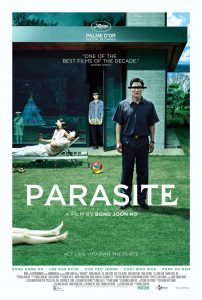
Dissecting the struggle between the classes through the lens of human nature and personal motivations – regardless of class status – provides the foundation for this rip-roaring dark comedy, one of those rare films that grabs your attention and holds it from start to finish without letting go. Building on themes explored in such previous works as “Snowpiercer” (2013), writer-director Bong Joon-ho presents a riveting, ruthless offering that undeniably makes its point but without being heavy-handed or cartoonishly over the top. In doing so, the filmmaker dishes out a wealth of utterly hilarious humor about subjects that ultimately prove to be no laughing matter. Easily one of the year’s best, especially in its razor-sharp writing, the fine performances of its excellent ensemble cast and a thought-provoking message that should give us all a lot to think about, this superb release never disappoints and consistently satisfies.
“Parasite” is already generating considerable awards season buzz, a tremendous accomplishment for a foreign language film. Having deservedly captured Palme d’Or honors at this year’s Cannes Film Festival, the event’s top prize, the picture is amassing ample clout as an Oscar contender in multiple categories, including best film, again, a remarkable coup for a foreign language offering. The picture is playing surprisingly widely on domestic movie screens, and it’s pulling down bigger-than-normal box office numbers for a non-US release. But, then, given the well-deserved accolades “Parasite” is garnering, those accomplishments are genuinely merited.
It’s unfortunate that we live in a world where so many unfairly go without. One would think that the fortunate would be more willing to share their abundance with those in need. What’s more, it’s understandable that the destitute would take drastic measures to preserve and protect themselves. However, when the downtrodden begin resorting to means like those used against them to obtain what they want, are they any better off in the end? One could say that they are themselves no different from the parasites who have oppressed them. And we all know what ultimately happens to parasites in the end.
Copyright © 2019, by Brent Marchant. All rights reserved.
The post ‘Parasite’ exposes the fallout of false intentions appeared first on Brent Marchant.
November 4, 2019
Check Out a Special Edition of The Cinema Scribe
Tune in for the latest Cinema Scribe segment on Bring Me 2 Life Radio, Tuesday, November 5, at 2 pm ET, available by clicking here. And, if you don’t hear it live, catch it later on demand!


The post Check Out a Special Edition of The Cinema Scribe appeared first on Brent Marchant.
October 29, 2019
Wrapping up the Chicago Film Festival
One of the great joys of reviewing movies is the opportunity to attend film festivals. They offer moviegoers a chance to see multiple offerings in myriad genres from countries all over the globe, featuring everything from little-known independent productions to Hollywood blockbusters. And so it is with my hometown event, the Chicago International Film Festival, which just recently completed its 55th edition.
The Chicago festival just keeps getting better and better every year. I’ve attended many of the festivals over the past 40 years (I started attending when I was 2…), and I’ve seen vast improvements in programming and staging in that time, efforts that have truly made this a world class event. Over 12 days, I screened 15 films, many of which were good to excellent.
With that in mind, I offer my thoughts and impressions on the pictures I saw. My scores, which are based on the 1-5 rating scale used by festival attendees, appear at the end of each of my evaluations. Lengthier reviews of some of these releases will be featured in future blog entries.
So sit back, relax and enjoy my journey through an inspired field of movies. And, if you should ever attend this event in the future, be sure to look for me on the red carpet. I’ll be there!

Photo by Trevor Laster.
“Babyteeth” (Australia)

The seemingly unlikely romance between a seriously ill teenager (Eliza Scanlen) and a junkie/small-time drug dealer (Toby Wallace) outrages her parents (Ben Mendelsohn, Essie Davis), despite the fact that mom and dad each engage in their own bad behavior and have more than their own share of issues. Yet, as this story plays out, it becomes apparent that those who are supposed to provide guidance can learn much from those they’re guiding.
With a tautly written script, a superb ensemble cast (especially Mendelsohn in one of his best performances), creative cinematography and a more than ample supply of quirky humor, this excellent debut feature from director Shannon Murphy ushers the audience through a minefield of emotions (especially in the film’s concluding sequence), leaving viewers moved – and drained – by picture’s end. Think of this as a slightly off-the-wall, bittersweet and decidedly more dysfunctional version of “Terms of Endearment” (1983), and you have the idea. A superb offering from a promising new talent. Don’t miss it. (5/5)

A seriously ill teenager (Eliza Scanlen) ponders an uncertain future in director Shannon Murphy’s debut feature, “Babyteeth.”
“Ordinary Love” (UK)
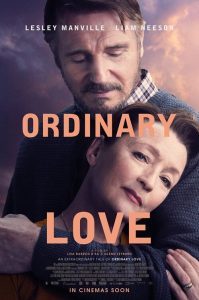
This sensitive, highly personal look at what a breast cancer diagnosis does to longtime happily married couple (Lesley Manville, Liam Neeson) evokes heartfelt emotions as the story wends its way through the ups and downs of coping with illness and an uncertain future. And, coming in the wake of the tragic and unexpected death of their only child, this latest burden is made all the more difficult for a wife and mother facing her own mortality and a husband and father staring down the prospect of being alone.
Directors Lisa Barros D’sa and Glenn Leyburn draw excellent award-worthy performances out of their two protagonists (especially Manville), presenting the audience with a couple who exude a comfortable familiarity at both their best and worst. The picture’s simple but effective cinematography and suitably fitting soundtrack greatly enhance the mood of the story, taking a subject that’s been addressed on film before and elevating it to an entirely new level of candor and viewer intimacy. A moving, exceedingly touching experience to be sure. (5/5)

A breast cancer patient (Lesley Manville, right) and her concerned husband (Liam Neeson, left) struggle to cope with the changes to their long-tenured relationship in “Ordinary Love.”
“Spider” (“Araña”) (Chile)

When a believed-dead right-wing Chilean nationalist (Marcelo Alonso) reappears decades after working with the radical Fatherland and Liberty movement to overthrow the Communist government of President Salvadore Allende, old ghosts from the past re-emerge from the woodwork, circumstances that create havoc for the story’s principals both personally and publicly. Told through a series of flashbacks seamlessly woven into the present-day narrative, the film reveals a complex political struggle that spills over from the day’s public events and into the personal lives of the movement’s participants (and vice versa), both in the past and the present.
Director Andrés Wood delivers an engaging, edge-of-your-seat thriller with both personal and public implications, as well as a message that’s just as important for today as it was in the past, and not just in Chile. “Spider,” a nominee for the festival’s Gold Hugo Award, the event’s highest honor, is yet another excellent example of the work coming out of one of the world’s foremost emerging film industries. (5/5)

Right-wing radicals (Maria Valverde, left, and Gabriel Urzúa, right) work on planning strategies to overthrow Chile’s leftist leadership in the early 1970s in director Andrés Wood’s Gold Hugo-nominated offering, “Spider” (“Araña”).
“Balloon” (“Qi Qui”) (China)
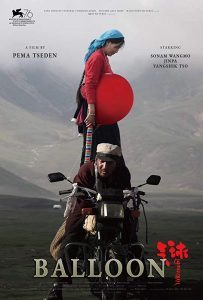
This paradoxical fable explores what happens when long-cherished spiritual beliefs collide with sociopolitical public policy in Tibet during the days of China’s one-child birth policy. To say more would reveal too much, but suffice it to say that the picture weaves a lush tapestry of thoughts and feelings that grows ever-more captivating the further one gets into its narrative.
Poetically told by director Pema Tseden, with inventive and often-breathtaking cinematography, an elegant soundtrack, gentle humor and an ethereal storytelling approach, this simple but stirring tale moves viewers in heartfelt ways at both ends of the emotional scale. While the pacing of this Gold Hugo nominee and best screenplay winner is a tad sluggish in the middle, that’s easily overlooked in light of everything else this excellent release has to offer. (5/5)

The clash of traditional spirituality and modern government policy affect three generations of a Tibetan family in director Pema Tseden’s “Balloon” (“Qi Qui”).
“The Father” (“Bashtata”) (Bulgaria/Greece)
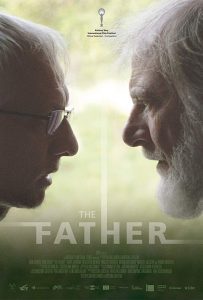
This touching charmer examines how a father (Ivan Savov) and son (Ivan Barnev) deal with the loss of their wife and mother (Maria Bakalova) while simultaneously sorting out long-simmering differences between them. But such serious matters get tabled when dad is convinced that his beloved is trying to communicate with him from the other side and seeks the aid of a shady mystic to learn what messages mom has for him, much to the consternation of his pragmatic son, who’s further burdened by challenges at work and the many moods of a sensitive pregnant wife (Margita Gosheva).
The result is a zany saga that combines both hilarious and meaningful moments filled with heartfelt emotion and more than a few startling synchronicities, all in an unlikely road trip/buddy film format. The picture’s deft fusion of comedy and drama weaves a captivating tale, one with both raw emotion and ample laugh-out-loud humor. A truly unexpected gem from the husband and wife directorial team of Kristina Grozeva and Petar Valchanov. (5/5)

A put-upon son (Ivan Barnev, left) attempting to help his out-of-control father on a zany road trip ends up in an array of wacky situations, such as being forced to hitchhike in a hearse, in the hilarious buddy film, “The Father” (“Bashtata”).
“The Truth” (“Le v erit à”) (France/Japan)

Director Hirokazu Kore-eda’s first foray into filmmaking outside Japan tells the story of an aging actress (Catherine Deneuve) who’s coming to grips with her life in the wake of writing her memoir, one that her daughter (Juliette Binoche) claims is full of oversights, exaggerations and lies. As they match wits in what has been a life-long struggle, the grand dame of French cinema takes on a new movie role in which she plays a character not unlike her daughter, giving her an opportunity to see things from a different perspective. Meanwhile, daughter dearest also discovers that her memory may be fallible and that her recollections of a rotten childhood may not be as accurate as she has long thought.
Deneuve gives a command performance, award-worthy for sure, and the script is full of ample, laugh-out-loud wit. The fine ensemble cast, featuring Binoche and Ethan Hawke, among others, provides excellent support for the film’s leading lady, serving as an excellent “audience” for her latest “performance.” Admittedly, the pacing in the final act could use some shoring up, but this otherwise-delightful offering is well worth the time. (4/5)

An aging actress (Catherine Deneuve, second from right) is forced to come to terms with her daughter (Juliette Binoche, second from left), along with her son-in-law (Ethan Hawke, left) and granddaughter (Clémentine Grenier, right), in director Hirokazu Kore-eda’s “The Truth” (“Le verità”),
“The Fever” (“A Febre”) (Brazil/France/Germany)
This richly metaphorical clash-of-cultures offering tells the story of an indigenous Brazilian security guard (Regis Myrupu) who leaves his village to work in the industrial port city of Manaus, where he becomes afflicted with a mysterious fever. In searching for the cause of his ailment, the protagonist scours myriad aspects of his life to figure out how to get well, a quest that symbolically reflects wider issues not only for himself, but also for the different peoples of an entire nation.
Filmmaker Maya Da-Rin, winner of the festival’s award for best director, presents an almost-poetic tale of the mystical and material. The film’s deliberately slow pacing (appropriate given the nature of the picture’s subject matter) can be a tad trying at times, but, if viewers can overlook this aspect, they’ll be treated to a moving and thought-provoking story brought to life by a fine ensemble cast of native, non-professional actors. A deceptively affecting offering and worthy Gold Hugo nominee. (4/5)

An indigenous Brazilian security guard (Regis Myrupu, right) seeks to discover the source of a mysterious illness in “The Fever” (“A Febre”), festival winner for best director Maya Da-Rin.
“Deerskin” (“Le daim”) (France)

Arguably the funniest one-joke movie I’ve ever seen, this absurd dark comedy from director Quentin Dupieux follows the strange exploits of a budding serial murderer (Jean Dujardin) who becomes obsessed with a newly acquired second-hand deerskin jacket that gives him a “killer” appearance. When the jacket begins “speaking” to him, however, things go from weird to truly bizarre, especially when it tells him that it wants to be the only jacket in the world, prompting its owner to look for ways to eliminate all of its competition – and at any cost.
This macabre offering is definitely not for everyone. Some of the violence may be a bit much for sensitive viewers, and the story could be just too strange for those who like their cinema a bit more conventional. But for those with off-the-wall tastes who like their horror films with a humorous edge, this one will definitely suit you. (4/5)

A budding serial killer (Jean Dujardin) starts slipping over the edge when he begins having bizarre conversations with his jacket as seen in the edgy, off-the-wall dark comedy, “Deerskin” (“Le daim”).
“The Whistlers” (“La Gomera”) (Romania/France/Germany)

This stylish, clever crime caper features an intriguing game of cat and mouse involving crooked Romanian detectives, ruthless Spanish gangsters, a pious Eastern Orthodox matriarch and a system of communications employing an ancient whistling language created in the Canary Islands. It’s a tale that combines its diverse elements to keep viewers guessing right up to the end.
Drawing upon dry humor, an operatic soundtrack and a series of stunning revelations, this Palme d’Or nominee from this year’s Cannes Film Festival takes viewers across three continents in a race aimed at trying to figure out who’s trying to outdo who (and why). While the narrative occasionally gets a little too convoluted for its own good, director Corneliu Porumboiu’s latest is otherwise a sinister but fun, visually dazzling romp. (4/5)

Crooked Romanian detectives, ruthless Spanish gangsters and a strange whistling language invented in the Canary Islands all combine for a clever, stylish crime drama in “The Whistlers” (“La Gomera”).
“The Wild Goose Lake” (“Nan Fang Che Zhan De Ju Hui”) (China/France)

This sometimes-campy, sometimes-intense, often-quirky crime drama about a motorcycle thief (Ge Hu) on the run from authorities and rival thugs features an eclectic mix of elements and influences ranging from contemporary Chinese cinema to French crime dramas to martial arts movies and even a pinch of Quentin Tarantino Lite. The picture’s “I-can’t-believe-they-just-did-that” humor adds spice and diversion, keeping the story lively, fresh and entertaining.
However, while the first half sails along well, the back end tends to meander somewhat, dragging out the story toward an ending that’s more than a little predictable. With better editing and a tighter script, especially in the concluding sequences, director Yi’nan Diao’s Palme d’Or nominee could have been a knock-out, but, unfortunately, it limps across the finish line instead of racing past it. (3/5)

A motorcycle thief (Ge Hu) on the run from authorities and rival thugs provides the narrative for the sometimes-campy, sometimes-intense crime drama, “The Wild Goose Lake” (“Nan Fang Che Zhan De Ju Hui”).
“Corpus Christi” (Poland/France)
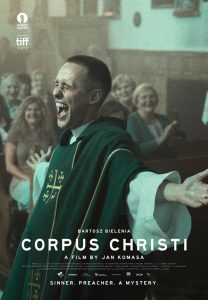
When a paroled juvenile inmate (Bartosz Bielenia) who desires to become a priest gets an opportunity to assume the identity of one without seminary training, he jumps at the chance, an act that allows him to see how well he’s able to follow a calling that has been detoured by his past. It’s a challenging undertaking that finds him constantly under the microscope as he’s pursued by ghosts of his prison days and scrutinized by parishioners who question his unconventional style of ministering.
However, while director Jan Komasa’s Gold Hugo nominee has its moments – most notably Bielenia’s stellar turn in the festival’s best actor performance – the overall package tries to incorporate too many plot lines and cover far too much ground, leaving certain important aspects (especially the protagonist’s motivations and back story) underdeveloped. A pared-down treatment would have benefitted this noble attempt nicely, making for a more focused and meaningful offering. (3/5)

A paroled juvenile offender who longs to be a priest (Bartosz Bielenia) gets an opportunity to explore his calling in director Jan Komasa’s “Corpus Christi.”
“Mr. Jones” (Poland/UK/Ukraine)

This fact-based biopic chronicles the efforts of British diplomat-turned-reporter Gareth Jones (James Norton) in attempting to expose Soviet dictator Josef Stalin’s genocide of Ukrainians in the years prior to World War II, an initiative that met with severe and surprising (and self-serving) opposition in Western diplomatic and journalistic circles. However, his intrepid efforts eventually brought to light a tragedy driven by opportunism and greed, both by its architect and those who benefitted by complicitly looking the other way.
Jones’s saga is a little-known story that screams qualities like “urgency” and “outrage,” traits that, unfortunately, don’t come across nearly as strongly in the film as they should have. Director Agnieszka Holland tends to understate the nature of the narrative, never quite raising it to the level of shock and engagement that the subject matter deserves, frequently muddling the flow of the story with extraneous, if not irrelevant, subplots. Think of this one as a compelling story with regrettably less-than-compelling treatment. (3/5)

The fact-based story of diplomat-turned-journalist Gareth Jones (James Norton) and his efforts to expose Josef Stalin’s genocide of Ukrainians in the years before World War II provides the story line for director Agnieszka Holland’s latest release, “Mr. Jones.”
“Jesus Shows You the Way to the Highway” (Spain/Estonia/Ethiopia/Latvia/Romania)
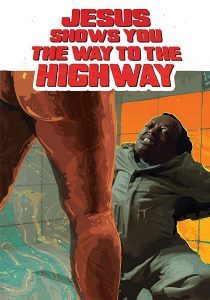
Devotees of the weird will appreciate this uniquely and utterly strange offering about a pair of CIA agents (Daniel Tadesse, Augustín Mateo) sent into cyberspace to destroy a computer virus, only to find that the truth is even more bizarre than thought. The result is one of the most inventive and outrageous films imaginable, easily leaving one’s mouth agape and head suitably scratched.
Through a mix of inventive animation, various photographic techniques and off-the-wall humor, director Miguel Llansó takes viewers on a wild, wild ride through a story that ultimately makes little sense but that generally entertains in its own special way. The picture has a tendency to get a little too wrapped up in its own quirkiness at times, coming across like “The Hitchhiker’s Guide to the Galaxy” (2005) or an episode of “Dr. Who” on steroids. But, if you can overlook that, you’ll get a lot of hearty laughs out of this one. (3/5)

Two CIA agents sent into cyberspace to destroy a computer vice have an unexpected encounter with “Jesus” (Guillermo Llansó, center) in the wacky comedy, “Jesus Shows You the Way to the Highway.”
“Atlantics” (“Atlantique”) (France/Senegal/Belgium)

Despite an award-winning pedigree, this mystical Senegalese romance/ghost story never quite gels into a cohesive (and, at times, understandable) whole. While the emotions seem sincere enough and the lyrical cinematography is beautiful to look at, the muddled plot of director Mati Diop’s debut feature is often befuddling as it attempts to blend unrequited love, social commentary and otherworldly elements into a single narrative.
Many of those attending my screening stepped away from it noticeably scratching their heads. Perhaps something was lost in translation. Perhaps the subtlety is a little too understated for its own good. Or perhaps the story was reaching for something it couldn’t adequately capture. In any event, this missed cinematic opportunity is an easily overlooked offering. (2/5)

Ada (Marne Bineta Sane), a bride-to-be promised to a man she doesn’t love, longs to pursue the romance of her choice, a quest shrouded in mystical influences in director Mati Diop’s debut feature, “Atlantics” (“Atlantique”).
“Fire Will Come” (“O que arde”) (Spain/France/Luxembourg)
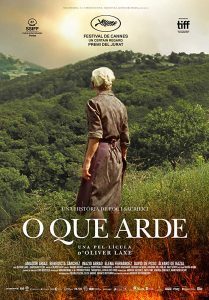
Gorgeous cinematography aside, this leaden-paced tale of a convicted arsonist (Amador Arias) who’s paroled from prison and returns to his rural Spanish homeland where a mysterious new forest fire breaks out struggles to find a story amidst its meandering narrative. Stunning landscape shots and extensive spans of silence (a contributing element to the picture’s award-winning sound design) may be aesthetically appealing, but they dominate to the point of deterring the film’s telling of an engaging and coherent story.
While director Oliver Laxe tries to use this film to make an environmental statement (albeit not all that effectively), it’s not enough to save this otherwise-woefully underdeveloped Gold Hugo nominee, despite its accolades, including a win and a nomination in the Un Certain Regard competition at this year’s Cannes Film Festival. Skip this one, and you won’t miss much. (1/5)

A mysterious forest fire believed set by a paroled arsonist sets the stage for the story in director Oliver Laxe’s award-winning “Fire Will Come” (“O que arde”).
Copyright © 2019, by Brent Marchant. All rights reserved.
The post Wrapping up the Chicago Film Festival appeared first on Brent Marchant.
October 28, 2019
Tune in for Movies with Meaning
Tune in for the latest Movies with Meaning segment on The Good Media Network’s Frankiesense & More broadcast on Facebook Live, Tuesday October 29 at 1:00 pm ET, by clicking here. Host Frankie Picasso and yours truly will discuss several new film releases, as well as highlights from the recent Chicago International Film Festival. And, if you don’t catch the show live, hear and watch it later on demand on Facebook or the web site of The Good Media Network, available by clicking here. You can also read more about the festival films by clicking here.



The post Tune in for Movies with Meaning appeared first on Brent Marchant.
October 15, 2019
An Apology
My apologies to those who were expecting to hear today’s Mission Unstoppable interview with filmmaker Assia Boundaoui about her new film, “The Feeling of Being Watched.” Due to an unexpected scheduling conflict, show host Frankie Picasso and yours truly were unable to bring this important broadcast to listeners today. We hope to reschedule for a new date in the future. Please stay tuned for details.



The post An Apology appeared first on Brent Marchant.
October 14, 2019
Check out The Cinema Scribe
Tune in for the latest Cinema Scribe segment on Bring Me 2 Life Radio, today, October 15, at 2 pm ET, by clicking here. And, if you don’t hear it live, catch it later on demand!


The post Check out The Cinema Scribe appeared first on Brent Marchant.
Tune in for Mission Unstoppable
Those who naively cling to the idea that government abuses of power, particularly when it comes to racial, social or ethnic profiling, can’t happen here need to rethink those notions. To find out more, tune in for a special edition of Mission Unstoppable on Tuesday October 15 at 1:40 pm ET, when host Frankie Picasso and yours truly will interview journalist and filmmaker Assia Boundaoui about her stunning new production, “The Feeling of Being Watched.” The film, which has been playing in limited theatrical engagements and in special screenings at film festivals and community centers, will air Monday October 14 on the PBS series POV and will thereafter be available for streaming on the POV web site. For more about the film, click here.

For the video version of the broadcast, tune in to Facebook Live at 1:40 pm ET by clicking here. And, for the audio-only version, available after the live broadcast, visit the Mission Unstoppable page on The Good Media Network web site by clicking here. Don’t miss this informative and provocative interview about what went on and what we can do to fight back.


The post Tune in for Mission Unstoppable appeared first on Brent Marchant.
October 13, 2019
This Week in Movies with Meaning
Reviews of “Judy” and “Joker,” as well as a broadcast preview, are all in the latest Movies with Meaning post on the web site of The Good Media Network, available by clicking here.


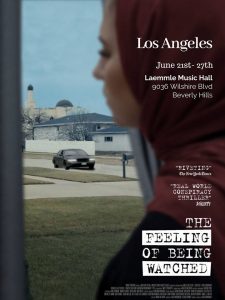



The post This Week in Movies with Meaning appeared first on Brent Marchant.
October 11, 2019
‘Joker’ gives us much to contemplate
“Joker” (2019). Cast: Joaquin Phoenix, Robert De Niro, Frances Conroy, Zazie Beetz, Brett Cullen, Shea Whigham, Bill Camp, Glenn Fleshler, Leigh Gill, Josh Pais, Douglas Hodge, Dante Pereira-Olson, Carrie Lauren Putrello, Sharon Washington, Hannah Gross, Brian Tyree Henry, Frank Wood, Carl Lundstedt, Michael Benz, Ben Warheit. Director: Todd Phillips. Screenplay: Todd Phillips and Scott Silver. Web site. Trailer.
It’s a rare feat when a film covers so much ground that it gives us a lot to take in and assess. In doing so, such stories may well make us feel more than a little uncomfortable (and rightfully so) as they prompt us to take a hard look at what we’re experiencing and how it came about. They may even push us toward taking action at changing what’s going on, even if they make us squirm a bit as we move toward such a decision. So it is with the controversial new fantasy tale, “Joker.”
Arthur Fleck (Joaquin Phoenix) has his share of issues. The psychologically challenged Gotham City resident struggles to hold it together with the aid of a cocktail of prescription meds and the regular, but largely indifferent, counseling of a public aid social worker (Sharon Washington). He ekes out a living as a special event clown, working jobs like retail clearance sales and visits to pediatric hospitals, where he shows off his distinctive cackle and fancy footwork. And, when he’s not engaged with the foregoing, he spends his time caring for his aging live-in mother, Penny (Frances Conroy), who has mental and physical challenges of her own.
For all intents and purposes, Arthur leads a pretty bleak existence. He and Penny live in a rundown apartment building in a marginal neighborhood, one that epitomizes everything that’s wrong with Gotham City. But, if that weren’t enough, Arthur is repeatedly harassed by strangers who assault him or steal his property, particularly when he’s dressed up in his clown outfit. He attempts to fight back, but he’s often hassled by packs of thugs, making it difficult to defend himself. It’s a wonder how he’s able to cope.

However, despite all these travails, Arthur manages to hold out hope for a better life. Having long been told by his mother that his purpose in life was to spread joy to others, Arthur aspires to become a stand-up comedian, perhaps even getting booked on a late night TV talk show hosted by an entertainer he greatly admires, Murray Franklin (Robert De Niro). And the first step toward that goal comes when Arthur gets a chance to try out his act at a local comedy club. Things could be looking up.
What’s more, Arthur has hopes for becoming involved in a meaningful relationship. He’s particularly attracted to his neighbor, Sophie Dumond (Zazie Beetz), a young single mother who seems to be on the same wavelength as him. And, when he believes she’s showing him some interest, he’s even more enthused.
But no sooner do Arthur’s hopes get raised when reality comes crashing down. He’s left to contend with the ongoing difficulties of his circumstances, as well as those of his mother, who often slips into bouts of delusion. For instance, she’s perplexed that she doesn’t receive responses to the many requests for help that she sends to Thomas Wayne (Brett Cullen), one of Gotham’s wealthiest residents and a recently announced mayoral candidate for whom she once worked. Arthur tries to explain to her that it’s unlikely she’ll hear from him, given that Mr. Wayne employed her only briefly many years ago and that he probably doesn’t remember her, despite the fervent hope she’ll hear from him. It’s truly sad.
Just when it seems things couldn’t get any worse, though, circumstances deteriorate even further. Arthur learns that his public aid support is being cut. Then he loses his job and suffers another attack while on his way home, this time at the hands of a trio of obnoxious Wall Street types (Carl Lundstedt, Michael Benz, Ben Warheit) with tragic consequences. He then learns a shocking secret that his mother has been harboring, a revelation that immediately precedes her hospitalization for a stroke. And, to top it off, he sees video footage of his comedy club performance on Murray’s show, presented in an insensitive and unflattering light.
In the meantime, conditions in Gotham begin spiraling out of control, especially where unchecked street crime and the increasingly inflammatory mayoral race is concerned. Criticism against candidate Wayne is running hot and heavy, especially in connection with comments he’s made about Gotham residents disdainful of the city’s wealthy elite. Having referred to these oppressed, largely working class individuals as “clowns,” Wayne’s detractors respond by embracing the derogatory label plastered on them. Masses of citizens wearing clown masks and outfits mobilize to protest the disempowerment and injustice they feel, spreading chaos far and wide.
By this point, Arthur is at wit’s end. He’s had as much as he can handle. He decides that it’s time to retaliate, especially now that he has a pair of detectives (Shea Whigham, Bill Camp) following him, too. And, with conditions being what they are, he’s inspired to take what he considers to be appropriate measures in response. But, considering how Arthur sees the world, those responses are unlikely to be of the kind expected in a civil society. With the clown phenomenon sweeping the city, Arthur, as one of the movement’s ironic predecessors, joins the fray, assuming the persona “Joker,” one that he believes reflects his emerging mindset – and one that will prove macabrely fitting as he seeks retribution against all of those whom he believes have wronged him.
So what’s one to make of all this? “Joker” is the kind of film that draws a variety of responses, depending on one’s own interpretation. Those interpretations are governed by the beliefs we hold, the cornerstones of the conscious creation process, the philosophy that maintains we draw upon these metaphysical building blocks in manifesting the reality we experience. This is a principle that applies quite broadly, too, both for real world audiences and the characters chiseling out the story on the screen.
“Joker” offers us a prime example of how our existence reflects our beliefs, again, both for viewers and Gotham’s residents. For instance, it’s more than a little obvious that the circumstances that define the characters and setting of the picture’s narrative are a mirror of present-day conditions off the screen, a result from the story’s (and prevailing conditions’) ultimate creators – us. We feel connected to those in the film, because they mirror what many of us believe about our world these days. This thus creates a link between what we’re feeling and what we’re watching, an uncanny parallel that may evoke reactions that feel like they hit more than a little too close to home.
The frustration that Arthur feels reminds many of us of the exasperation we feel with regard to many of today’s ills – ineffectual, self-serving politicians, indifferent, money-grabbing corporations, rampant violent crime, and insensitivity toward those with special needs, to name a few. And the more he adheres to those beliefs, the more pervasive these conditions become. However, if he ever hopes for anything better, he must change his beliefs, taking them in other directions – something that we must do as well if we hope for new circumstances to become established in our reality. Instead, however, Arthur relishes these conditions, embracing them more than ever as his story plays out – a potent cautionary tale for us, too, if we ever hope for our conditions to change.
Even though Arthur and his followers seek to redress what they’re experiencing, they fight back using means comparable to what they claim to detest. In essence, they perpetuate the prevailing conditions, only with them at the helm, by employing like beliefs in combatting what they supposedly consider unacceptable. His behavior calls to mind such cinematic antiheroes as Travis Bickle (Robert De Niro) from “Taxi Driver” (1976), Rupert Pupkin (Robert De Niro) from “The King of Comedy” (1982) and D-Fens (Michael Douglas) from “Falling Down” (1993). There’s quite an irony in that as the oppressed seek to become the oppressors. And it’s not an answer for those who hope for their situations to change, again, something viewers should ponder as they seek to do the same in their reality.
This scenario arises in various segments of society. For instance, the film makes quite a statement when it comes to its view of how Gotham (and, by extension, the real world) treats the mentally ill. The unfeeling, uncaring attitude that pervades the handling of these individuals speaks volumes about the beliefs driving such treatment. Is it any wonder, then, that those impacted in this way would eventually act out in an effort to get what they require to cover their basic needs?
Likewise, a similar case can be made for the nonconformists of society. Early on in the story, for instance, Arthur routinely suffers abuse at the hands of those who see him in his clown outfit, labeling him some kind of “freak,” even though he’s just wearing the garb needed to do his job. That sort of intolerance is prevalent in Gotham, and it increasingly rings bells about how many of us in our society are treated these days. It’s yet another warning to us about how we handle ourselves – and others.
At bottom in all of these situations is a failure to consider alternatives, to look for new beliefs aimed at rectifying what we’ve mishandled in our creative efforts. Instead of examining ways to set things to right, we sink deeper and deeper into the morass of beliefs that spawned the mess we’re in, creating an ever-deepening hole that becomes increasingly difficult for us to extract ourselves from. That’s a bleak prospect, one that bolsters the dark nature of this film – and a view of our off-screen world that’s unfortunately becoming far too entrenched.
In tackling the foregoing, “Joker” takes on quite a formidable task, and it’s to be lauded for its attempt to nudge movies in the comic book genre in an entirely new direction. And, in doing so, it gets many aspects right, such as its excellent, 1970s-style production design and the mostly solid (though occasionally hammy) performance by Joaquin Phoenix. It also sends a clear warning to us about ourselves, albeit one that’s both cautionary and potentially incendiary at the same time.
Yet, despite these strengths, the picture has its share of problems as well. Uneven pacing, mishandled back story revelations, heavy-handed sociopolitical allegories, excessive narrative elements, violence bordering on gratuitous and plot holes aplenty all conspire to weaken an otherwise-ambitious production. What’s more, at the risk of playing spoiler, the film features an ending that’s out of place compared to the apparent climax that preceded it. And then there are derivative elements taken almost verbatim from a variety of other pictures, including the aforementioned “Taxi Driver,” “The King of Comedy” and “Falling Down,” as well as “Network” (1976) and others. What this movie gets right is indeed impressive, but, unfortunately, there’s not enough of that compared the package overall. In this case, the glass truly is half empty.
Given the breadth of territory that “Joker” seeks to cover, it’s undoubtedly one of those pictures that’s creating considerable conversation and on a multitude of fronts. In that regard, it could be doing us all a favor by prompting discussion of conditions that we’ve been all too willing to disregard. The 800-pound gorilla in our reality has indeed been identified and exposed. But will we take advantage of this opportunity to bring about meaningful change? Or will we descend even further into the mess we’ve created, giving us “inspiration” to further justify unacceptable behavior and perpetuate ineffectual attitudes? There’s a lot of food for thought in that. So get ready to grab your fork – and dig in.
Copyright © 2019, by Brent Marchant. All rights reserved.
The post ‘Joker’ gives us much to contemplate appeared first on Brent Marchant.



